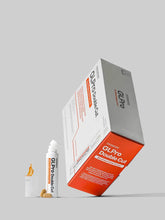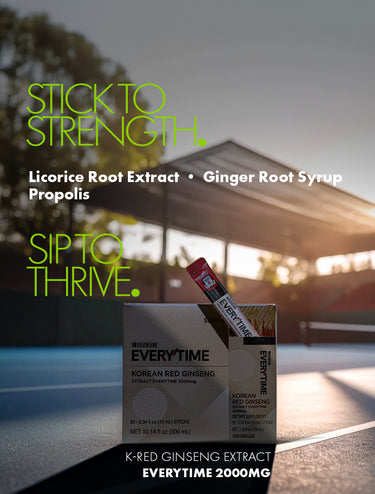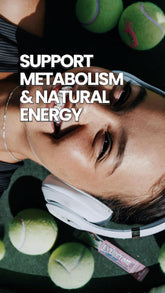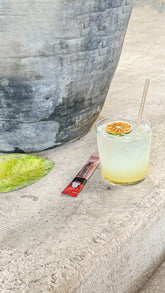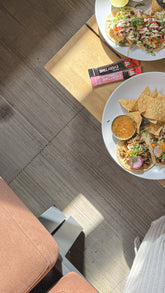Celebrating Progress on Worlds AIDS Day: The Potential of Korean Red Ginseng in Advancing HIV Care
- 11 Cohort Studies Illustrate Korean Red Ginseng’s Potential to Improve Immune Health in HIV Care From 1991 to Today.
CERRITOS, Calif., December 01, 2024/ -- Korea Ginseng Corp. US (KGCUS), aka JungKwanJang, joins the global community in observing World AIDS Day, honoring those living with HIV and the advancements in care. As we reflect on the strength and resilience of the HIV community, we also celebrate the hope that science and holistic treatments bring. Research from 11 cohort studies, including long-term studies that span up to 20 years, demonstrates the potential of Korean Red Ginseng (KRG in short) to enhance immune health and improve quality of life. These findings offer individuals a complementary, natural approach to traditional treatments, providing new prospects for those living with HIV. By supporting overall well-being, Korean Red Ginseng offers a holistic healthcare option that can help enhance wellness during HIV treatment.
A series of groundbreaking studies have revealed that KRG has the potential to slow HIV progression, preserve immune function, and enhance the effectiveness of highly active antiretroviral therapy (HAART).
One of the most significant findings from the research is Korean red ginseng’s ability to slow the decline of CD4 T cells—key immune cells that are essential for defending the body against infections. HIV causes the progressive depletion of these cells, leading to a weakened immune system. In a study examining long-term HIV-1 patients who had not been on medication, those who took Korean red ginseng showed a significantly slower loss of CD4 T cells compared to those who didn’t take the root. Patients who consumed higher amounts of Korean red ginseng experienced an annual CD4 loss of approximately 14 cells per microliter, compared to 49 cells per microliter in patients who consumed little or no Korean red ginseng. Preserving immune cells is vital for maintaining natural defenses and delaying the need for early antiretroviral therapy.
2. Weakening the Virus through Genetic Disruption3, 6, 7, 8
Beyond boosting immunity, Korean red ginseng has also demonstrated the ability to genetically disrupt HIV. Long-term Korean red ginseng intake caused significant defects in the HIV nef gene, which is essential for replication and immune evasion. This led to a higher frequency of deletions in the gene, impairing the virus’s ability to replicate effectively in HIV-1 patients. These genetic changes weaken the virus, slowing disease progression and potentially reducing its harm. Longer duration and higher dosage of KRG intake may strengthen immune defense by further impairing the virus's adaptability.
3. Enhancing HAART Effectiveness4, 6, 9
Korean Red Ginseng does not only work as a standalone treatment; it also has complementary benefits when combined with highly active antiretroviral therapy (HAART). HAART is the current standard of care for HIV, but over time, patients can develop resistance to these drugs, making treatment less effective. Studies show that KRG can help reduce the incidence of drug-resistance mutations. In a clinical trial, patients who took both HAART and KRG had significantly fewer resistance mutations compared to those taking HAART alone—just 7.1% of the KRG group developed new resistance mutations over three years, compared to 42.1% of the HAART-only group.
A key challenge in treating HIV is the virus’s ability to change the coreceptor it uses to infect cells. This change, called coreceptor switching, can lead to faster disease progression. The virus shifts from the R5 coreceptor (which causes less harm) to the X4 coreceptor (which is more harmful). In a study, HIV-1 patients who took KRG had a 2.35 times longer delay before the virus switched from R5 to X4. This delay gives current treatments more time to work, potentially slowing disease progression and helping patients manage HIV more effectively.
Korean Red Ginseng offers more than just support for HIV treatment. Research suggests that regular use of KRG may also lower the risk of cancer. One study found that men who took KRG had a 65% lower risk of developing cancer, further highlighting its potential health benefits. With its wide-ranging benefits, Korean Red Ginseng stands out as a natural, holistic approach to improving health and minimizing the risk of chronic conditions.
KRG’s ability to support immune function, reduce drug resistance, and potentially weaken the virus makes it a valuable addition to HIV care. By enhancing the effectiveness of conventional treatments and promoting overall well-being, KRG provides a holistic approach to living with HIV. As the studies continue to emerge, KRG could become an essential part of HIV care strategies, offering patients a natural and scientifically supported way to manage their health.
About Korea Ginseng Corp.
Korea Ginseng Corp. (KGC), a global herbal dietary company, is home to the world's number one ginseng brand, JungKwanJang. Established in 1899, it is one of the most proven and trusted herbal dietary supplement manufacturers, providing the highest quality, traditionally harvested Korean Red Ginseng products to support health and well-being. KGC runs four regional headquarters in the United States, China, Japan, and Taiwan, in addition to South Korea, and exports products to over 40 countries. With over 40% world market share, its presence spans Asia, Europe, the Middle East region and the U.S. KGC's family of brands includes JungKwanJang, Good Base, and Donginbi. The 250+ KGC brands use the most exceptional ginseng combined with the finest herbs and ingredients to deliver superior products to meet everyone's needs.
References
1. Korean Red Ginseng Significantly Slows CD4 T Cell Depletion over 10 Years in HIV-1 Infected Patients: Association with HLA. (2004, December 1). Journal of Ginseng Research. Elsevier BV. https://doi.org/10.5142/jgr.2004.28.4.173
2. Sung, H., Kang, S. M., Lee, M. S., Kim, T. G., & Cho, Y. K. (2005). Korean red ginseng slows depletion of CD4 T cells in human immunodeficiency virus type 1-infected patients. Clinical and diagnostic laboratory immunology, 12(4), 497–501. https://doi.org/10.1128/CDLI.12.4.497-501.2005
3. Cho, Y. K., Lim, J. Y., Jung, Y. S., Oh, S. K., Lee, H. J., & Sung, H. (2006). High frequency of grossly deleted nef genes in HIV-1 infected long-term slow progressors treated with Korean red ginseng. Current HIV research, 4(4), 447–457. https://doi.org/10.2174/157016206778560072
4. Sung, H., Jung, Y. S., & Cho, Y. K. (2009). Beneficial effects of a combination of Korean red ginseng and highly active antiretroviral therapy in human immunodeficiency virus type 1-infected patients. Clinical and vaccine immunology : CVI, 16(8), 1127–1131. https://doi.org/10.1128/CVI.00013-09
5. Cho, Y. K., & Kim, J. E. (2017). Effect of Korean Red Ginseng intake on the survival duration of human immunodeficiency virus type 1 patients. Journal of ginseng research, 41(2), 222–226. https://doi.org/10.1016/j.jgr.2016.12.006
6. Cho, Y. K., Jung, Y. S., & Sung, H. (2009). Frequent gross deletion in the HIV type 1 nef gene in hemophiliacs treated with Korean Red Ginseng: inhibition of detection by highly active antiretroviral therapy. AIDS research and human retroviruses, 25(4), 419–424. https://doi.org/10.1089/aid.2008.0178
7. Cho, Y.-K., & Jung, Y.-S. (2010, September 30). Dosage and Duration Effects of Korean Red Ginseng Intake on Frequency of Gross Deletions in the nef Gene. Journal of Ginseng Research. Elsevier BV. https://doi.org/10.5142/jgr.2010.34.3.219
8. Cho, Y. K., Kim, J. E., & Woo, J. H. (2017). Genetic defects in the nef gene are associated with Korean Red Ginseng intake: monitoring of nef sequence polymorphisms over 20 years. Journal of ginseng research, 41(2), 144–150. https://doi.org/10.1016/j.jgr.2016.02.005
9. Cho, Y. K., Jung, Y., Sung, H., & Joo, C. H. (2011). Frequent Genetic Defects in the HIV-1 5' LTR/gag Gene in Hemophiliacs Treated with Korean Red Ginseng: Decreased Detection of Genetic Defects by Highly Active Antiretroviral Therapy. Journal of ginseng research, 35(4), 413–420. https://doi.org/10.5142/jgr.2011.35.4.413
10. Cho, Y. K., Kim, J. E., & Lee, J. (2023). Korean Red Ginseng slows coreceptor switch in HIV-1 infected patients. Journal of ginseng research, 47(1), 117–122. https://doi.org/10.1016/j.jgr.2022.06.003
11. Yun, T. K., Zheng, S., Choi, S. Y., Cai, S. R., Lee, Y. S., Liu, X. Y., Cho, K. J., & Park, K. Y. (2010). Non-organ-specific preventive effect of long-term administration of Korean red ginseng extract on incidence of human cancers. Journal of medicinal food, 13(3), 489–494. https://doi.org/10.1089/jmf.2009.1275




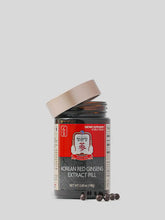


 Stamina
Stamina Energy
Energy Immunity
Immunity Antioxidant
Antioxidant Beauty
Beauty Fitness
Fitness Blood Circulation
Blood Circulation Liver & Heart
Liver & Heart Bones & Joints
Bones & Joints Eye & Brain
Eye & Brain Digestion
Digestion Relax & Sleep
Relax & Sleep For All
For All Men's Health
Men's Health Woman's Health
Woman's Health Kid's Health
Kid's Health Jar
Jar Stick
Stick Pouch
Pouch Root & Slices
Root & Slices Shot
Shot Pill
Pill Tea & Powder
Tea & Powder Candy
Candy